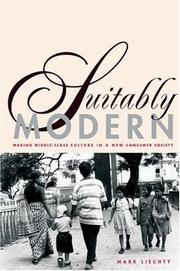| Listing 1 - 3 of 3 |
Sort by
|
Book
Year: 1983 Publisher: Louvain-la-Neuve : Cabay,
Abstract | Keywords | Export | Availability | Bookmark
 Loading...
Loading...Choose an application
- Reference Manager
- EndNote
- RefWorks (Direct export to RefWorks)

ISBN: 0521336015 0521332915 0511571720 0511872267 9780521332910 9780521336017 9780511571725 Year: 1994 Publisher: Cambridge Cambridge University press
Abstract | Keywords | Export | Availability | Bookmark
 Loading...
Loading...Choose an application
- Reference Manager
- EndNote
- RefWorks (Direct export to RefWorks)
Dual arguments have become a standard tool for analysis of problems involving optimization by consumers and producers. The principal aim of this book is to provide a fairly systematic yet simple exposition of the basic structure of such arguments. The emphasis is not on providing mathematically general proofs; instead, a geometric approach is used to provide, in an informal way, an intuitive understanding of duality theory. This book introduces the most common alternative ways of representing preferences and technologies, such as indirect utility and distance functions, expenditure and cost functions, and profit and revenue functions. and it discusses the assumptions under which alternative formulations contain precisely the same information. Results such as Roy's identity. the Hotelling-Wold identity, and Shephard's lemma are fully explained. as are their roles in facilitating analysis of behaviour.
330.1 --- 330.1 Economische grondbegrippen. Algemene begrippen in de economie --- Economische grondbegrippen. Algemene begrippen in de economie --- Analyse microéconomique --- Courbe de demande (Theorie economique) --- Demand functions (Economic theory) --- Dualiteit [Theorie van de ] (Wiskunde) --- Dualité [Théorie de la ] (Mathématiques) --- Mathematics duality theory --- Theorie van de dualiteit (Wiskunde) --- Théorie de la dualité (Mathématiques) --- Verbruikers --- Vraagcurve (Economische theorie) --- DEMAND FUNCTIONS (Economic theory) --- Consumer behavior --- Duality theory (Mathematics) --- Econometric models --- Microeconomics --- Price theory --- Economics --- Econometrics --- Mathematical models --- Algebra --- Mathematical analysis --- Topology --- Demand curves (Economic theory) --- Functions, Demand (Economic theory) --- Behavior, Consumer --- Buyer behavior --- Decision making, Consumer --- Human behavior --- Consumer profiling --- Market surveys --- Quantitative methods (economics) --- Econometric models. --- Consumer behavior. --- Microeconomics. --- Consumers --- 330.00 --- 330.3 --- 339.20 --- AA / International- internationaal --- Economische en sociale theorieën: algemeenheden --- Methode in staathuishoudkunde. Statische, dynamische economie. Modellen. Experimental economics --- Verdeling van de goederen en van de inkomens: algemeenheden --- Business, Economy and Management --- Microéconomie --- Modèles économétriques --- Demande (économie politique) --- Dualité, Principe de (mathématiques) --- Consommateurs --- Attitudes --- Microéconomie --- Modèles économétriques --- Demande (économie politique) --- Dualité, Principe de (mathématiques)

ISBN: 0691095922 0691095930 Year: 2003 Publisher: Princeton, N.J. : Princeton University Press,
Abstract | Keywords | Export | Availability | Bookmark
 Loading...
Loading...Choose an application
- Reference Manager
- EndNote
- RefWorks (Direct export to RefWorks)
Suitably Modern traces the growth of a new middle class in Kathmandu as urban Nepalis harness the modern cultural resources of mass media and consumer goods to build modern identities and pioneer a new sociocultural space in one of the world's "least developed countries." Since Nepal's "opening" in the 1950s, a new urban population of bureaucrats, service personnel, small business owners, and others have worked to make a space between Kathmandu's old (and still privileged) elites and its large (and growing) urban poor. Mark Liechty looks at the cultural practices of this new middle class, examining such phenomena as cinema and video viewing, popular music, film magazines, local fashion systems, and advertising. He explores three interactive and mutually constitutive ethnographic terrains: a burgeoning local consumer culture, a growing mass-mediated popular imagination, and a recently emerging youth culture. He shows how an array of local cultural narratives--stories of honor, value, prestige, and piety--flow in and around global narratives of "progress," modernity, and consumer fulfillment. Urban Nepalis simultaneously adopt and critique these narrative strands, braiding them into local middle-class cultural life. Building on both Marxian and Weberian understandings of class, this study moves beyond them to describe the lived experience of "middle classness"--how class is actually produced and reproduced in everyday practice. It considers how people speak and act themselves into cultural existence, carving out real and conceptual spaces in which to produce class culture.
Consumption (Economics) --- Middle class --- Kathmandu (Nepal) --- Social conditions. --- Bourgeoisie --- Commons (Social order) --- Middle classes --- Social classes --- Consumer demand --- Consumer spending --- Consumerism --- Spending, Consumer --- Demand (Economic theory) --- Social conditions --- Catmandoo (Nepal) --- Katmandu (Nepal) --- Khatmandu (Nepal) --- Chia-te-man-tu (Nepal) --- Kāṭhamāḍauṃ (Nepal) --- Yem̐ (Nepal) --- Yam̐ (Nepal) --- Yẹn (Nepal) --- Kāṭhamāṇḍau (Nepal) --- Kāntipura (Nepal) --- Kantipur (Nepal) --- KTM (Nepal) --- Appadurai, Arjun. --- Barthes, Roland. --- British colonialism in South Asia. --- Butler, Judith. --- Doordarshan. --- Douglas, Mary. --- Foucault, Michel. --- Fuglesang, Minou. --- Japan. --- Kakar, Sudhir. --- Kett, Joseph. --- Kluge, Alexander. --- Musical Hour. --- Nepali, G. S. --- Rana era. --- Ranas. --- Schein, Louisa. --- Simmel, Georg. --- Sloane, Patricia. --- Somers, Margaret. --- Thapa, Bhim Sen. --- Weber, Max. --- Wilson, Elizabeth. --- code switching. --- consumer society. --- consumption. --- cultivation effect. --- development. --- drugs (illegal). --- education. --- embodiment. --- gender. --- globalization. --- magazines. --- media assemblage. --- media: and imagination. --- modernity. --- nationalism. --- prostitution. --- radio. --- remittance economy. --- sumptuary laws. --- television. --- tourism. --- video. --- youth culture. --- classe moyenne. --- classe moyenne --- Consommation --- Classes moyennes --- Middle class. --- Société de consommation --- Descriptive sociology --- Social history --- History --- Sociology --- societe de consommation --- Katmandou (Nepal) --- Nepal --- Nepal. --- Katmandou (Népal) --- Nīpāl --- Ni-po-erh --- Nepāḥ --- Nepal Adhirajya --- Kingdom of Nepal --- Nepāla --- Federal Democratic Republic of Nepal --- Sanghiya Loktāntrik Ganatantra Nepāl --- Непал --- Savezna Demokratska Republika Nepal --- República Federal Democràtica del Nepal --- Kongeriget Nepal --- Demokratische Bundesrepublik Nepal --- Νεπάλ --- Nepalo --- Federacia Demokratia Respubliko Nepalo --- República Federal Democrática de Nepal --- Nepali Demokraatlik Liitvabariik --- Nepalgo Errepublika Demokratiko Federala --- Nepalin demokraattinen liittotasavalta --- République démocratique fédérale du Népal --- נפאל --- Sambandslýðveldið Nepal --- ネパール --- Nepāru --- 네팔 --- Nepalia --- Federale Democratische Republiek Nepal --- Nepālas Federālā Demokrātiskā Republika --- Федеративная Демократическая Республика Непал --- Federativnai︠a︡ Demokraticheskai︠a︡ Respublika Nepal --- Савезна Демократска Република Непал --- Республіка Непал --- Respublika Nepal --- Федеративна Демократична Республіка Непал --- Federatyvna Demokratychna Respublika Nepal --- Cộng hòa dân chủ liên bang Nepal --- 尼泊尔 --- Nibo'er --- Conditions sociales. --- Classe moyenne --- Petite bourgeoisie --- Hommes des classes moyennes --- Femmes des classes moyennes --- Classes sociales --- Consommation (économie politique) --- Consommation (théorie économique) --- Dépenses de consommation --- Consommation de tabac --- Consommateurs --- Consommation collaborative --- Cyberconsommation --- Consommation durable --- Abondance (économie politique) --- Coopératives de consommation --- Crédit à la consommation --- Impôt sur la consommation --- Indice des prix à la consommation --- Pouvoir d'achat --- Prix --- Rationnement --- Société de consommation --- Demande (économie politique) --- Comportement --- Federativnai͡a Demokraticheskai͡a Respublika Nepal --- Nepā --- Kātmāndu (Népal) --- Kathmandou (Népal) --- Kathmandu (Népal) --- Kāṭhamāṃḍū (Népal) --- काठमांडू (Népal) --- Kāṭhamāḍauṃ (Népal) --- काठमाडौं (Népal) --- Kāṭhmāḍaṃ (Népal) --- काठ्माडौं (Népal) --- Kāntipura (Népal) --- कन्तिपुर (Népal) --- Kantipur (Népal) --- Kāntipura nagara (Népal) --- कान्तिपुर नगर (Népal) --- Yeṃdey (Népal) --- येंदेय् (Népal) --- Théorie de la culture de consommation --- Attitude
| Listing 1 - 3 of 3 |
Sort by
|

 Search
Search Feedback
Feedback About UniCat
About UniCat  Help
Help News
News